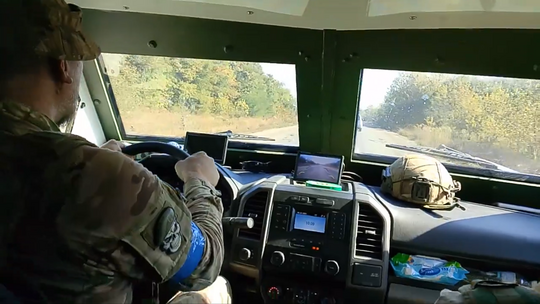On 26 September, De Luca published an article for the Italian newspaper Domani covering the cross-border Ukrainian offensive in Russian territory, after entering the region under Ukrainian military escort.
As the reporter shared on X, De Luca entered the Kursk region on the morning of 25 September with other journalists and came back to Sumy, northeastern Ukraine, around 3 pm that day. The publication of the video on board an armoured vehicle of the Kyiv army triggered the hostile reaction of FM spokesperson Zakharova. On her Telegram Channel, Zakharova warned the journalist would end up on the government’s list of wanted journalists for illegally crossing the Russian-Ukrainian border in Sudzha.
The government official also referred to Italian journalist Stefania Battistini, recently added to Russia’s list of wanted journalists, adding that “the journalist of the Italian publication Domani Davide Maria De Luca has poorly studied the laws of the Russian Federation (...) and apparently he decided to test his fate.”
Zakharova’s declaration, accompanied by a montage of the screenshot of Domani's publication and De Luca's video on X, put the journalist in danger. Viewed by over nine thousand people and widely commented on, De Luca has since been the target of dozens of threatening X posts and messages on Instagram, mainly from Russian and Italian accounts, calling for his arrest, as well as death threats.
“I knew being part of Russia's wanted list was a possibility, but I did not expect to be called out on the Foreign Ministry spokesperson's Telegram channel. Apart from my safety and the serious restrictions on my work, such actions have serious consequences for press freedom and access to information. First and foremost, newsrooms are afraid to send journalists in the occupied zone and often they won't allow journalists on the list to keep reporting in Ukraine. Civilians in the region are the first to be affected by this situation. If journalists are not on the ground and reporting is silenced, we cannot witness and report on their situations,” said De Luc.
De Luca is the latest media professional to be added to the list. In late August, Russia’s Federal Security Services opened criminal cases against five foreign journalists - British reporter Nick Paton Walsh; Ukrainian correspondents Olesya Nikolaevna Borovik and Diana Vladimirovna Butsko; and Italian journalists Stefania Battistini and cameraman Simone Traini - for the same reason.
So far, De Luca is not aware of any official charges being made public against him. The Italian Foreign Ministry told him there was little doubt that he is on the list.
FNSI General Secretary Alessandra Costante stated: “FNSI stands beside ourcolleague De Luca. Russia's obstinacy in wanting to investigate and prevent the right to freedom of the press is surprising. We would like decisive action from the Italian State to prevent the activity of Italian journalists, De Luca and others, from being chilled by judicial investigations that acre clearly designed asretaliation for Italy's political position in the conflict followed to the invasion of Ukraine”
“Russia’s tactics to censor the work of international journalists covering the war, including legal prosecution, set a dangerous precedent that undermines media freedom and the public's right to know. We stand in full solidarity with De Luca and all journalists who have been unjustly added to Russia’s wanted list for simply doing their jobs. We strongly condemn threats against De Luca, a case that is particularly disturbing given that the intimidation comes from a government official. Russia’s government must stop putting journalists in danger,” said the IFJ-EFJ

